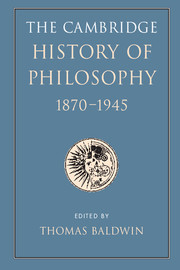Book contents
- Frontmatter
- Contents
- List of contributors
- Introduction
- I 1870–1914
- II 1914–1945
- 8 Logic and philosophy: the analytic programme
- 9 The diversity of philosophy
- 10 Knowledge, language, and the end of metaphysics
- 11 Philosophy and the exact sciences
- 12 Mind and its place in nature
- 13 Philosophy and social science
- 14 Ethics, religion, and the arts
- 58 From intuitionism to emotivism
- 59 Philosophy of religion
- 60 Literature as philosophy
- 61 Aesthetics between the wars: art and liberation
- 15 Law and politics
- Biobibliographical appendix
- Bibliography
- INDEX
- References
60 - Literature as philosophy
from 14 - Ethics, religion, and the arts
Published online by Cambridge University Press: 28 March 2008
- Frontmatter
- Contents
- List of contributors
- Introduction
- I 1870–1914
- II 1914–1945
- 8 Logic and philosophy: the analytic programme
- 9 The diversity of philosophy
- 10 Knowledge, language, and the end of metaphysics
- 11 Philosophy and the exact sciences
- 12 Mind and its place in nature
- 13 Philosophy and social science
- 14 Ethics, religion, and the arts
- 58 From intuitionism to emotivism
- 59 Philosophy of religion
- 60 Literature as philosophy
- 61 Aesthetics between the wars: art and liberation
- 15 Law and politics
- Biobibliographical appendix
- Bibliography
- INDEX
- References
Summary
A survey of the themes which preoccupied writers and philosophers in parallel between 1914 and 1945, some perennial, some of more recent urgency, would doubtless include the following: relativism; the subjectivity of perception; the paradoxes of temporality; the instability of the self; vitalism and the limits of reason; the validity of intuition as a basis for knowledge; the mind–body relationship; the inadequacy, in expression or representation, of conceptual language; the problem of meaning; the relation between art and life. In the rich creativity of the period three paradigm texts stand out in that they do not simply mirror but actively renew reflection on these issues: Marcel Proust’s A la recherche du temps perdu (In Search of Lost Time) (1913–27), Thomas Mann’s Der Zauberberg (The Magic Mountain) (1924), and Jean-Paul Sartre’s La Nausée (Nausea) (1938). Proust’s emphasis on discontinuity and contingency complicates his supposed affinity with Bergson; Mann’s dialogue with the ongoing legacy of Nietzsche evolves throughout his career; Sartre’s pre-war novel is a phenomenological and heuristic fiction which clears the ground for his future theory.
PROUST: A LA RECHERCHE DU TEMPS PERDU
Proust’s ‘search for lost time’ was also a search for truth – a search which would entail a portrayal of our errors. And, indeed, in the experience of his hero, Marcel, and in the often disabused voice of his narrator (Marcel’s older self), errors proliferate, whether they be perceptual errors, errors of self-knowledge, errors of recollection, or errors in Marcel'ment of others. Perception yields no sense of a stable world; vivid flights of imagination or expectation find no correspondence or fulfilment in an elusive reality.
- Type
- Chapter
- Information
- The Cambridge History of Philosophy 1870–1945 , pp. 714 - 720Publisher: Cambridge University PressPrint publication year: 2003



